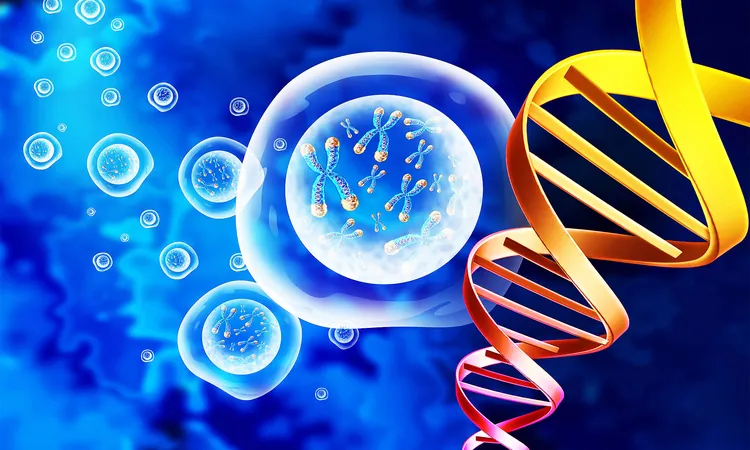
Shocking Discovery Reveals the Ages When Our Bodies Start to Decline
2025-03-30
Author: Kai
As we all know, aging is an inevitable part of life, but new research presents startling revelations about when and how our bodies begin to deteriorate. Contrary to popular belief, the aging process is not linear; instead, it experiences sharp shifts at specific ages.
A recent study spearheaded by Michael Snyder, the chair of genetics at Stanford School of Medicine, has uncovered critical moments in our biological aging journey, challenging previous assumptions about the gradual decline associated with getting older. This research draws upon data from individuals aged 25 to 75, revealing significant biological changes corresponding to two key ages: 44 and 60.
Two Critical Ages of Change
Snyder's research highlights that aging encompasses far more than visible signs like wrinkles and gray hair. It reveals a hidden biological timeline that is strikingly similar across humanity. Notably, 81% of the molecules studied don’t follow a regular pattern of change; instead, they exhibit dramatic shifts at these two precise ages that could reshape our understanding of the aging process.
These changes aren’t just abstract molecules; they have tangible correlations to health issues. For instance, molecules associated with cardiovascular disease and immune function undergo significant transformations by the time individuals enter their mid-40s to early 60s. With cardiovascular disease being a leading global cause of death, these findings highlight an urgent need to pay attention to our health as we approach these ages.
The Role of the Microbiome
Part of the study's focus was on the microbiome—an intricate community of trillions of microbes living within us. Most reside in our intestines, playing crucial roles in digestion, nutrient absorption, immune function, and even mood regulation. When the balance of these microbes is disrupted, whether due to stress, poor diet, or antibiotics, it can negatively impact various aspects of our health.
As we age—particularly during those critical years—shifts within our microbiome could contribute to the onset of age-related maladies, making awareness of our dietary choices more integral to our health than ever.
Lifestyle Implications: Can We Combat Aging?
The findings suggest that lifestyle choices may greatly influence these drastic changes. For many, the mid-40s often bring increased stress, which can affect how well our bodies metabolize certain substances, including alcohol and caffeine. Changes in these metabolic pathways could kickstart a chain reaction of health challenges.
Studying these lifestyle interactions is the next step for researchers. By examining the interplay between diet, physical activity, and stress management with the aging process, they hope to develop strategies that promote healthier aging.
Genetics Matter Too
Along with environmental factors and lifestyle habits, our genetics play a critical role in how we age. Individual genetic variations can predispose us to certain health issues, influencing how effectively our bodies manage stress, repair injuries, and metabolize substances.
Understanding our genetic makeup could lead to personalized healthcare strategies that enhance our longevity and quality of life. Emphasizing preventive measures during our 40s and 60s, such as regular exercise and mindful nutrition, may prove essential in mitigating the aging process.
In conclusion, the study underscores the importance of being proactive about our health during pivotal ages to stave off age-related decline. Michael Snyder suggests, "We should try to adjust our lifestyles while we’re still healthy," reiterating the importance of awareness and action in promoting long-term health.
For deeper insights into this groundbreaking research, check out the findings published in Nature Aging. Stay tuned for more updates—we’re dedicated to keeping you informed on the latest discoveries in health and longevity!


 Brasil (PT)
Brasil (PT)
 Canada (EN)
Canada (EN)
 Chile (ES)
Chile (ES)
 Česko (CS)
Česko (CS)
 대한민국 (KO)
대한민국 (KO)
 España (ES)
España (ES)
 France (FR)
France (FR)
 Hong Kong (EN)
Hong Kong (EN)
 Italia (IT)
Italia (IT)
 日本 (JA)
日本 (JA)
 Magyarország (HU)
Magyarország (HU)
 Norge (NO)
Norge (NO)
 Polska (PL)
Polska (PL)
 Schweiz (DE)
Schweiz (DE)
 Singapore (EN)
Singapore (EN)
 Sverige (SV)
Sverige (SV)
 Suomi (FI)
Suomi (FI)
 Türkiye (TR)
Türkiye (TR)
 الإمارات العربية المتحدة (AR)
الإمارات العربية المتحدة (AR)